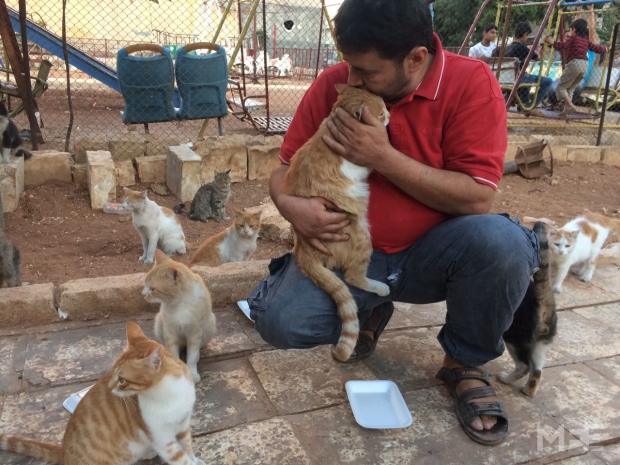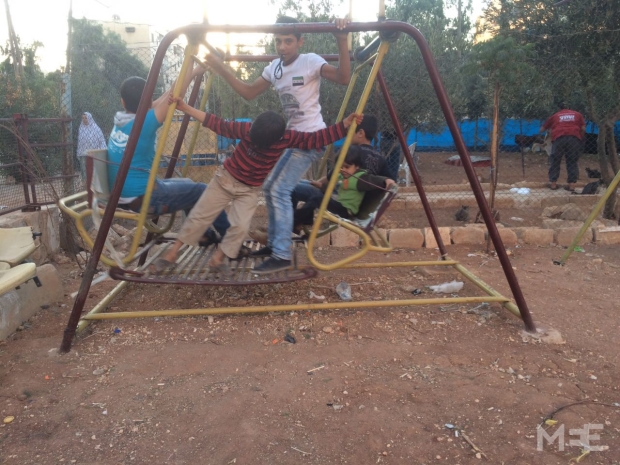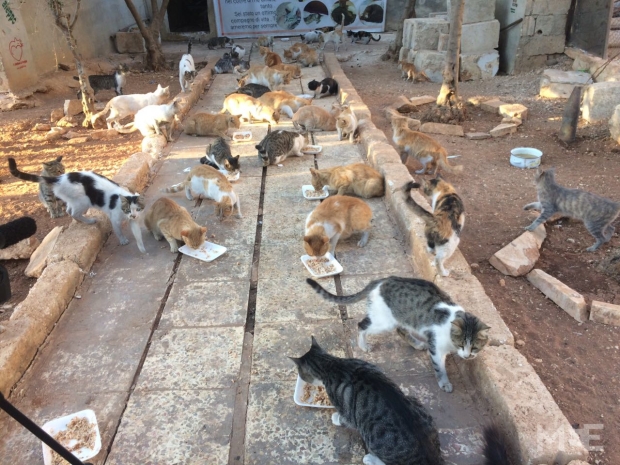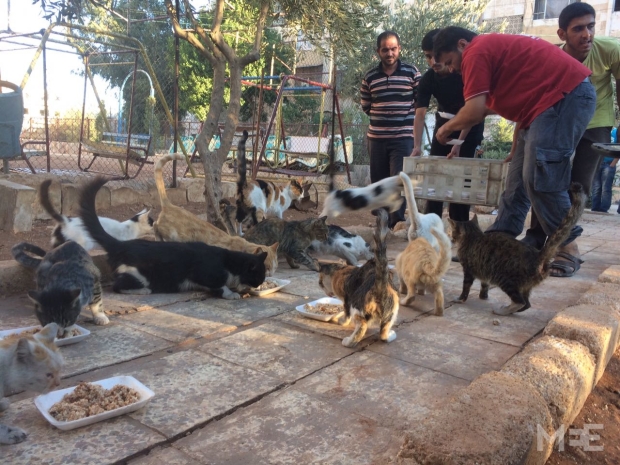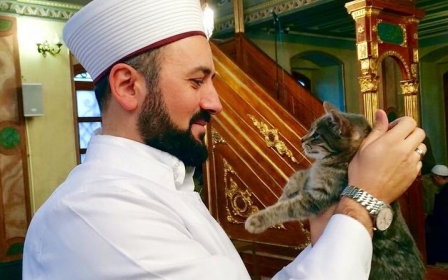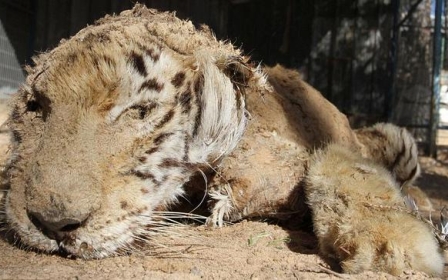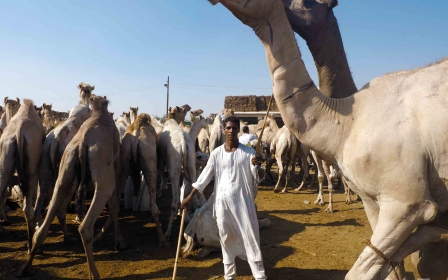Cat sanctuary of Aleppo helps feed animals and brings joy to children
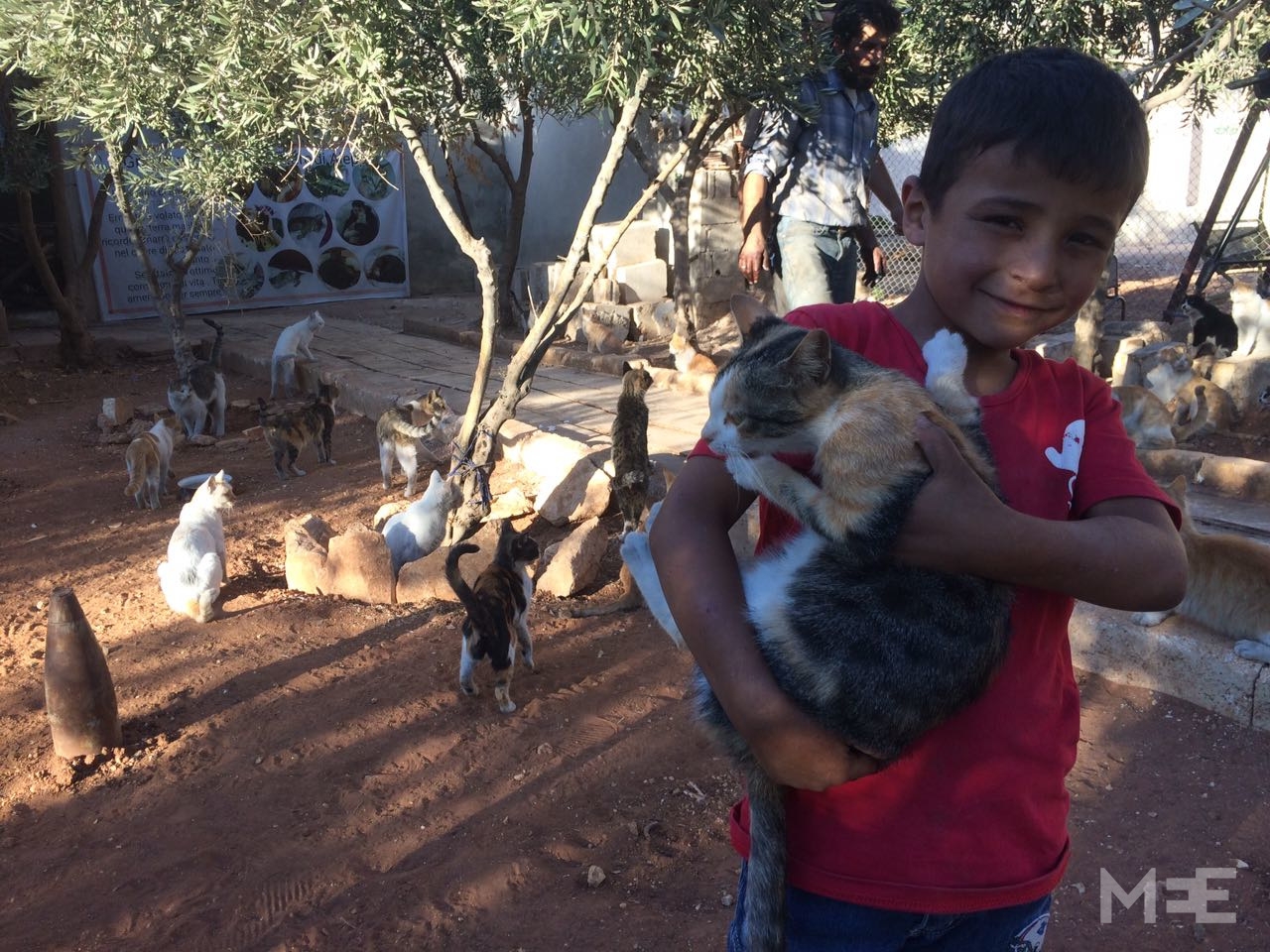
ALEPPO - With thousands of people having been forced to flee eastern Aleppo over the last few years, many without their belongings, resident Mohammad Alaa Aljaleel noticed the homeless cat population increasing.
A maintenance worker before the war reached his city in 2012, Aljaleel, who has always loved cats, built a small garden for the animals.
Initially the cat sanctuary was a modest affair – a small area outside his house, cordoned off to protect the orphaned cats from stray dogs, where he could feed the hungry animals.
“I started with 15 cats in the house, but gradually I have ended up with more than 150 cats from all over the city,” he tells Middle East Eye.
“And every day I have new additions join us in the house - some of them just come to eat and then they spend the night elsewhere,” but around 100 cats sleep in the house each evening.
Under a crippling siege since July, which was broken for around one month, eastern Aleppo is also facing an unprecedented bombing campaign by the Syrian government and Russia, with at least 358 people killed since the breakdown of a truce negotiated between the US and Russia.
Schools have been intermittently closed, and food, medicine and fuel are increasingly hard to come by.
It was with this suffocation in mind, and thanks to donations from around the world, that Aljaleel decided to turn the cat sanctuary into a playground, simultaneously providing for the animals and offering Aleppo’s children a chance to play and escape their everyday worries.
“It was enough money to expand and improve the cat house, I added trees to the garden outside, and swings and seesaws.”
“Now, children from around the neighbourhood, and other districts as well, come and play in the park and in the cat house,” he says.
As word of his work spread, donations arrived from around the world – Europe, South America and the United States, in an effort organised by Alessandra Abidin, a Lebanese-Italian.
“My beloved cat Ernesto died last year, and I wanted to make a donation in his memory,” she tells MEE.
“He was like a baby to me, I loved him so much.”
After a quick search, she found a mention of Aljaleel and his cat sanctuary on Facebook.
“So I wrote to him and told him that I wanted to help him with a little donation in memory of my cat, and he told me that lots of other people had written to him, asking him how they could donate,” Abidin, a professional violinist who also teaches music to refugees, says.
“But because of language barriers and sending money to Syria there were a lot of problems,” she adds, so she offered to help him coordinate the fundraising campaign.
There are now around 70 members who routinely send money each month, “nice loving people who have an interest in humanity,” as Aljaleel describes them, and hundreds of others who have made one-off donations.
Finding food
When he began feeding the stray cats, three years ago, Aljaleel was able to buy offcuts from the butchers – at a cost of around £4 (approximately $5) a day. But that is no longer an option, as the east of the city fell under total siege and fresh meat became a rare luxury even for human residents.
“Now there is not enough for humans, let alone cats, so I feed them what me and my family are eating,” he says.
“I cook rice for them and mix it with canned Mortadella (Italian-style deli meat) so they can at least still get the taste of meat.”
But despite his culinary efforts, the cats took some persuading.
“They didn't eat it for the first three days, but as their hunger increased they began to love it.”
Aljaleel now feeds them each one meal per day, “so they can survive for as long as possible, as we don’t know how long the siege will last.”
The donations now coming in cover the costs of the cat food so many times over that Aljaleel has been using the funds to help others.
In addition to building the children’s playground, he has around three months' worth of food supplies, which he gives to those most in need.
“We help mostly orphans and widows who don’t have any way to find their daily food,” he says.
This includes Ibrahim, the recently orphaned son of “the last flower seller of Aleppo," so that he can provide food for his brothers, and hopefully reopen his father’s now-defunct florist business.
The excess money has also allowed Aljaleel to dig civilian wells and buy two vans for his work as a voluntary medic.
Working on call, 24 hours a day, Aljaleel transports dead and injured people to the nearest medical point, but the vans lack full ambulance facilities.
“This is taking up a lot of my days now, as the bombardment has been so brutal,” he says.
“I have to go anytime, whenever I get a call saying there has been a bomb, I just go. So, all of the donations go to humanitarian work, whether it goes to the cat house or whether it is helping transfer people to the closest medical facility.”
Loss of cat life
Cats have not been spared the bombardment.
When an injured cat was found among the rubble of a destroyed building a few months back, a White Helmet Civil Defence rescuer brought the animal to Aljaleel, known locally for his love of cats.
The cat was bleeding and had a broken leg, and Aljaleel drove for an hour at night to take her to a vet outside of the city – this was before the siege had fully encircled eastern Aleppo.
“He took care of her and she recovered, and then I took her back with me, he recalls now.
“It was a very touching moment when this cat was healed – it’s the same feeling as saving a human life." But now the siege has closed the east of the city off entirely, and there is little access to human doctors, let alone veterinarians. Less than 30 doctors remain for some 275,000 people.
Aljaleel is unable to have the cats neutered, and they are reproducing at a fast rate, he says, but the mothers are often too under-nourished to look after their litters.
“We lose many of the kittens because the mother abandons her babies, and the street dogs come and eat them, or they are not eating enough themselves and so cannot produce milk to feed the kittens.”
Cat cafes may be a hipster favourite from Tokyo to London, but Aljaleel insists his initiative is the first of its kind in Syria and the wider Middle East – a public space where children can play and spend time with homeless cats, who in turn are being fed and looked after.
It is his dream to export his cat garden project around the world.
"I am planning to make it bigger and share this fantastic experience with many other countries in the world. One day I want a full park dedicated to the city’s cats, where people can bring their children to play with their feline friends, and enjoy their weekend – this is my dream.”
Unperturbed by the war and the destruction it has wreaked, Aljaleel remains committed to his city and his cats.
“I don't want to leave the city or migrate from my country as many of my friends have done. I want to stay here with my struggling neighbours, and help them, and the cats.”
This article is available in French on Middle East Eye French edition.
New MEE newsletter: Jerusalem Dispatch
Sign up to get the latest insights and analysis on Israel-Palestine, alongside Turkey Unpacked and other MEE newsletters
Middle East Eye delivers independent and unrivalled coverage and analysis of the Middle East, North Africa and beyond. To learn more about republishing this content and the associated fees, please fill out this form. More about MEE can be found here.


